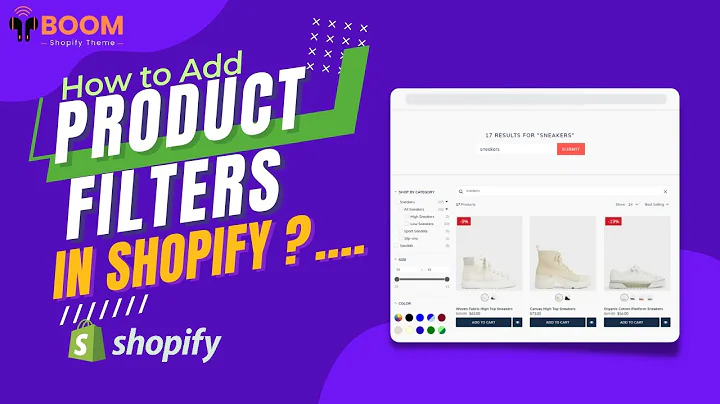Streamline Your Online Store with StoreHub Integration
Table of Contents
- Introduction
- Integration with Accounting Software
- ERP Systems
- Sales Platforms
- E-Commerce Solution
- Integration Options for Existing Online Stores
- Integrating Multiple Sales Platforms
- Differentiating between Retail and B2B Integrations
- Syncing Stock and Price
- Automatic Fetching of Product Data
- Honoring VAT Rates
- Setting Up StoreHub for Existing Online Stores
- Managing Stock Across Multiple Warehouses
- Key Settings for Retail Integrations
- Syncing Orders and Sales Documents
- Managing Merchandising Data
- Warehouse Setup for Multi-Warehousing
- Logistical Issues with Syncing Stock
- Benefits of StoreHub Integration
- Conclusion
Integration with Accounting Software for Automatic Price and Stock Updates
In today's competitive e-commerce landscape, seamless integration between your online store and accounting software is crucial for smooth operations. At StoreHub, we offer a comprehensive solution that allows you to integrate with various ERP systems and sales platforms, ensuring automatic price and stock updates. In this article, we will explore the details of our integration process and the benefits it brings to your retail business.
1. Introduction
Running an online store involves managing various aspects, from inventory and customer accounts to financial data. Integrating your accounting software with your online store can streamline these processes and ensure accurate and up-to-date information across all platforms. StoreHub offers integration with leading ERP systems and sales platforms, allowing you to sync data seamlessly and save time and effort in manual updates.
2. Integration with Accounting Software
- ERP Systems
StoreHub integrates with a range of ERP systems, including both desktop-based and server-based solutions. Our system connects to your ERP via a desktop connection or API, enabling the smooth transfer of stock and price data to StoreHub. This integration ensures that your online store always reflects the most accurate inventory levels and pricing information.
- Sales Platforms
In addition to ERP systems, StoreHub also integrates with popular sales platforms like WooCommerce and Shopify. This allows you to link your product information from StoreHub to these platforms, enabling smooth operations and a seamless shopping experience for your customers. Our integration list is constantly growing, so be sure to check our website for the most up-to-date information on supported platforms.
3. E-Commerce Solution
To give you a visual understanding of how StoreHub's e-commerce solution works, let's consider a quick sketch diagram. The integration process is similar across all ERP systems. Your ERP system serves as the hub for all financial and inventory data, including stock levels, customer accounts, and more. StoreHub connects to your ERP system and pushes stock and price data to your online store.
4. Integration Options for Existing Online Stores
If you already have an existing online store on platforms like WooCommerce or Shopify, StoreHub offers two integration options.
The first option is to use your existing merchandising data from your online store. In this case, StoreHub will only push price and stock updates to your store and fetch back orders to your ERP system. This option is suitable if you have already invested time and effort into merchandising your products and don't want to duplicate that effort.
The second option is to migrate all your merchandising data to StoreHub. This option is ideal if you have multiple online sales platforms or warehouses. By centralizing your merchandising data in StoreHub, you can push the data to multiple platforms simultaneously, saving time and ensuring consistency across all channels.
5. Integrating Multiple Sales Platforms
StoreHub allows you to integrate multiple sales platforms, making it easy to manage different online stores for different regions or customer segments. Suppose you have three different WooCommerce stores linked to three different warehouses. In that case, StoreHub can manage the merchandising data for all three locations, ensuring consistency and efficiency.
6. Differentiating between Retail and B2B Integrations
It's essential to differentiate between retail and B2B integrations to cater to the unique requirements of each segment. Retail integrations focus on online sales channels, stock management, and pricing for individual customers. On the other hand, B2B integrations involve concepts like sales reps, multiple price lists, customer-specific discounts, and restricted products. Understanding the distinction allows us to tailor the integration settings to your specific needs.
7. Syncing Stock and Price
Once the integration is set up, StoreHub automatically fetches all your product data, including stock levels, SKU codes, and descriptions. Our system also honors VAT rates, ensuring accurate taxation for your products. All the relevant data is pushed to your WooCommerce store, ensuring that your online store always reflects the most up-to-date information.
8. Setting Up StoreHub for Existing Online Stores
Setting up StoreHub for existing online stores is straightforward. Once the integration is in place, your stock and price data will sync instantly. You can manage the software easily using our user-friendly interface. If you ever need to make changes to the sync settings or upload new products, you can do so easily from your StoreHub account.
9. Managing Stock Across Multiple Warehouses
If your business operates from multiple warehouses, managing stock levels can be challenging. StoreHub provides a solution to this logistical issue by recommending the setup of multiple online stores, each connected to a specific warehouse. This way, you can accurately display stock levels for each location and fulfill orders from the respective warehouse. We advise against syncing stock from multiple warehouses to a single retail store due to potential shipping complications and increased costs.
10. Key Settings for Retail Integrations
StoreHub offers various key settings that make managing your retail integrations much easier. These settings include:
- Stock on hand or stock available: Choose the stock type you want to display on your online store.
- Tax inclusive or exclusive prices: Set your preferred pricing structure.
- Backorder allowance: Control whether or not backorders are permitted.
- Retail price list: Define the price list to be displayed on your online store.
- Sync preferences: Choose whether to push price and stock updates and manage stock on your WooCommerce store.
- Sales document type: Determine the type of sales document to be raised in your accounting software for different types of orders.
These settings allow you to customize StoreHub to match your specific retail requirements.
11. Syncing Orders and Sales Documents
StoreHub automatically fetches all the orders placed through your online store and syncs them with your ERP system. This ensures that all order information, including line items, quantities, tax rates, delivery and billing addresses, is seamlessly captured in your accounting software. Our system also generates sales documents such as quotes, sales orders, and invoices based on the type of transaction.
12. Managing Merchandising Data
StoreHub provides a user-friendly interface for managing your product merchandising data. You can easily edit product names, images, descriptions, and other information. The platform supports global attributes and variations, allowing you to create different options for your products. Additionally, you can manage categories, import data via CSV files, and toggle the visibility of specific items across different sales platforms.
13. Warehouse Setup for Multi-Warehousing
For businesses with multiple warehouses, StoreHub recommends selecting a primary warehouse as the main source of stock and price data. Other warehouses can be set up to handle specific orders, with the items flagged as quotes only. This ensures that all orders are fulfilled from the appropriate warehouse, minimizing logistical complications and enhancing operational efficiency.
14. Logistical Issues with Syncing Stock
Syncing stock from multiple warehouses to a single retail store can lead to logistical challenges. For example, if a customer pays a shipping fee based on the stock location nearest to them, fulfilling the order may require shipping from multiple warehouses, resulting in increased costs. To avoid these complications, it is best to set up multiple online stores, each connected to a specific warehouse.
15. Benefits of StoreHub Integration
StoreHub's integration with accounting software offers several benefits for your retail business:
- Automatic updates: Price and stock data is automatically synced between your ERP system and online store, eliminating the need for manual updates.
- Seamless operations: Integration streamlines processes, ensuring accurate and up-to-date information across all platforms.
- Time and effort savings: The automation provided by StoreHub reduces the time and effort required for inventory management and order processing.
- Consistency and accuracy: By centralizing merchandising data, StoreHub ensures consistent and accurate product information across multiple sales platforms.
- Enhanced customer experience: Accurate stock levels and pricing information on your online store improve the shopping experience for your customers.
16. Conclusion
Integrating your online store with your accounting software is essential for efficient and accurate operations. StoreHub's comprehensive integration solution simplifies this process, allowing you to sync stock and price data effortlessly. With customizable settings and seamless integration with ERP systems and sales platforms, StoreHub provides a streamlined solution for managing your retail business. Take advantage of this integration to enhance your operations and deliver an exceptional experience to your customers.
Highlights
- StoreHub offers seamless integration between your online store and accounting software for automatic price and stock updates.
- Integration is available for various ERP systems and sales platforms, ensuring compatibility with your existing infrastructure.
- You can choose between migrating merchandising data to StoreHub or using your existing data from platforms like WooCommerce and Shopify.
- StoreHub's integration solution simplifies stock management across multiple warehouses and sales channels.
- The system automatically fetches product data and syncs orders with your accounting software, saving time and effort.
- By centralizing merchandising data, StoreHub ensures consistency and accuracy across all sales platforms.
- Integration with StoreHub improves operational efficiency and enhances the customer shopping experience.
FAQ
Q: Can StoreHub integrate with any ERP system?
A: StoreHub supports integration with a wide range of ERP systems. However, the supported systems may vary, so it's best to check our website for the most up-to-date information.
Q: Can I manage stock levels separately for each warehouse?
A: Yes, StoreHub allows you to manage stock levels for each warehouse individually and sync the data with your online store accordingly.
Q: How long does it take to set up StoreHub integration for an existing online store?
A: The setup time for integration with an existing online store is typically around 30 minutes. Our consultants or business partners will provide a handover and support you throughout the process.
Q: Can I use my existing merchandising data from WooCommerce or Shopify with StoreHub?
A: Yes, StoreHub allows you to use your existing merchandising data from platforms like WooCommerce and Shopify. This saves you from duplicating efforts in product merchandising.
Q: What are the benefits of integrating StoreHub with my accounting software?
A: Integration with StoreHub automates the syncing of stock and price data between your ERP system and online store, saving time and ensuring accuracy. This results in streamlined operations and an enhanced shopping experience for your customers.


















